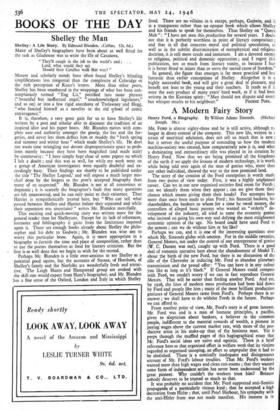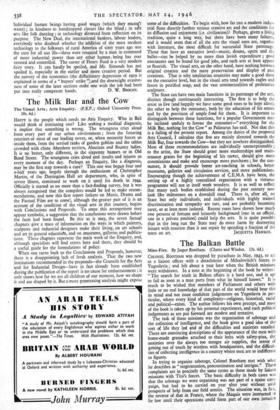A Modern Fairy Story
Henry Ford, a Biography. By William Adams Simonds. (Michael Joseph. 18s.) MR. FORD is almost eighty-three and he is still active, although n ) longer in direct control of the company. This new life, written in .1 strain of uncritical adulation, does not tell us much that is new ; but it serves the useful purpose of reminding us how the modern machine-society was created, how comparatively new it is, and what a dominating and extraordinary role was played in its creation by Henry Ford. Now that we are being promised all the kingdoms of the earth if we apply the lessons of modern technology, it is worth while being told over again of the man of genius who, more than any other individual, showed the way to the new promised land.
The story of the creation of the Ford enterprises is worth study from two points of view today. First, it was a highly unplanned career. Can we in our new organised societies find room for Fords ; can we identify them when they appear ; can we give them their chance which means giving them their heads? For attempts have more than once been made to plan Ford ; his financial backers, his shareholders, the bankers to whom for a time he owed money, the controllers of alleged basic patents who wanted an " orderly " de- velopment of the industry, all tried to tame the eccentric genius who insisted on going his own way and defying the most enlightened economic opinion of the age. No board could have used Ford to the .utmost ; can we do without him or his like? Perhaps we can, and it is one of the interesting questions over which Mr. Simonds glides with unction. For in the middle twenties, General Motors, not under the control of any entrepreneur of genius (W. C. Durant was out), caught up with Ford. There is a good deal of romantic narrative here about the abandonment of Model T, about the birth of the new Ford, but there is no discussion of tht role of the Chevrolet in inducing Mr. Ford to abandon planetary transmission and the proud offer: "You can have it in any colour you like as long as it's black." If General Motors could compete with Ford, we needn't worry if we can in fact reproduce General Motors. That will be easier than finding another Ford. And yet, by 1926, the lines of modern mass production had been laid down by Ford and people like him ; many of the most brilliant production geniuses of General Motors came from Ford's. Perhaps there is no answer ; we shall have to do withdut Fords in the future. Perhaps we can afford to.
From another point of view, MT. Ford's story is of great interest. Mr. Ford was and is a man of humane principles, a pacifist, given to sCepticism about bankers, a believer in the common people, indifferent to the material rewards of wealth, a pioneer in paying wages above the current market rate, with more of the pro- ductive artist in his make-up than of the business man. Yet it peeps through the muffled pages of this hagiographical essay that Mr. Ford's social ideas are naive and egoistic. There is a brief reference here to that organised effort in welfare work that its victims regarded as organised snooping, an effort so unpopular that it had to be abolished. There is a comically inadequate and disingenuous account of Mr. Ford's labour troubles. That Mr. Ford's workers wanted more than high wages and clean rest-rooms ; that they wanted some form of independent action has never been understood by the great pioneer. Why couldn't the workers trust him? Because nobody deserves to be trusted as much as that. It was probably no accident that Mr. Ford supported anti-Semitic propaganda of a particularly vicious kind ; that he accepted a high decoration from Hitler ; that, until Pearl Harbour, his sympathy with the anti-Hitler front was not made manifest. His interest is in
individual human beings having good wages (which they mustn't waste); in kindness to handicapped classes like the blind ; in sale arts like folk dancing in technology divorced from reflection on its purpose. The New Deal, the international bankers, labour leaders, everybody who doubted whether the addition of the most modern technology to the folkways of rural America of sixty years ago was the cure for all our ills—these were resented by a man in command of more industrial power than any other human , being has ever created and controlled. The career of Henry Ford is a very modern fairy story. It can hardly be spoiled, and Mr. Simonds has not spoiled it, especially in the earlier and more creative period. But the naivety of the economics (the deflationary depression of 1929 is explained in terms of a "buyers' strike "),and the downright evasive- ness of some of the later sections make one wish the job had been



























 Previous page
Previous page